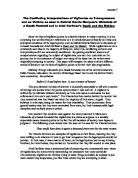Chronicle of a Death Foretold. How does Marquezs use of labels reflect the cultural beliefs about women in society?
How does Marquez’s use of labels reflect the cultural beliefs about women in society?
The Colombian society in Marquez’s ‘Chronicle of a Death Foretold’ is a predominant character throughout the story; it is the alpha in the novel as it calls all the shots for the people who live in the town. The most distinctive role of society is that of creating labels. Labels are created through memories and actions that the society thinks ‘defines’ an individual. The tags are used interchangeably with names, which is how an individual is remembered. The smallness of the town ensures that no memory of a person is ever forgotten but only tainted further. Labels are dissected according to the society’s cultural beliefs. Labels reflect the gender expectations imposed by society as demonstrated by Angela Vicario and Bayardo San Roman. Labels mirror the status and role of women in society like that of the cook, the prostitute and the nuns. They also make us question who the ‘victim’ is.
Society is constructed out of a narrow-minded group of ‘traditional’ thinkers who take upon themselves the right to set the parameters of social behaviour, beliefs and norms. The labels that they create only aid in dividing the people further down into categories. Certain ‘cults’ for example the ‘cult of virginity, machismo and honour’ are predominant beliefs that help draw the line within which a certain group must act. The cults of machismo and virginity presuppose that women must abide by the conduct a man sees as fit, be as pure as a virgin offering herself for sacrifice on the night of her marriage to a man who thinks himself superior in all forms. The men are of ‘tough’ calibre, the ‘protectors’ and ‘saviours’ like the Vicario brothers who ‘restored’ their sisters “honour”. It is the irony of the fate of women that they are labelled as commodities: virgins and whores; low class and high class; fresh and stale.
The most prominent divide in society is that of the genders. Angela Vicario is one such “beautiful” entity that was ‘returned’ by Bayardo because she breaks out of the social norms by losing her virginity and her ‘honour’ (prevailing conflict and theme throughout the novel) to a man out of wedlock. ‘Returned’ suggests that she is flawed hence cannot be married to a macho man or accepted by society. The word ‘beautiful’ reflects society’s shallowness while judging women. No wonder the women are commoditized into epithets such as beautiful, virgins and pure, not unlike the virgin oil, the virgin forests and the virgin wool in the Latin American society. Bayardo San Roman, “the man who returned his bride”, was justified in his shameful behavior toward Angela as being a man he deserves a fresh and a virgin woman. Through the text translated by Rabassa there are undercurrents of the ironical tone adopted by Marquez when he insinuates that it is quintessential duty of a woman to keep her “treasure box” intact for her husband to enjoy himself of it! It is very ironical that a woman is judged by the label she wears, and she must make sacrifice her sexuality, her desires and her right to lead her life on an equal footing with man. One of the main concerns of Marquez behind writing this historical novel in a fictionalized version is to make the reader aware of the double standards prevailing in the Columbian culture.








